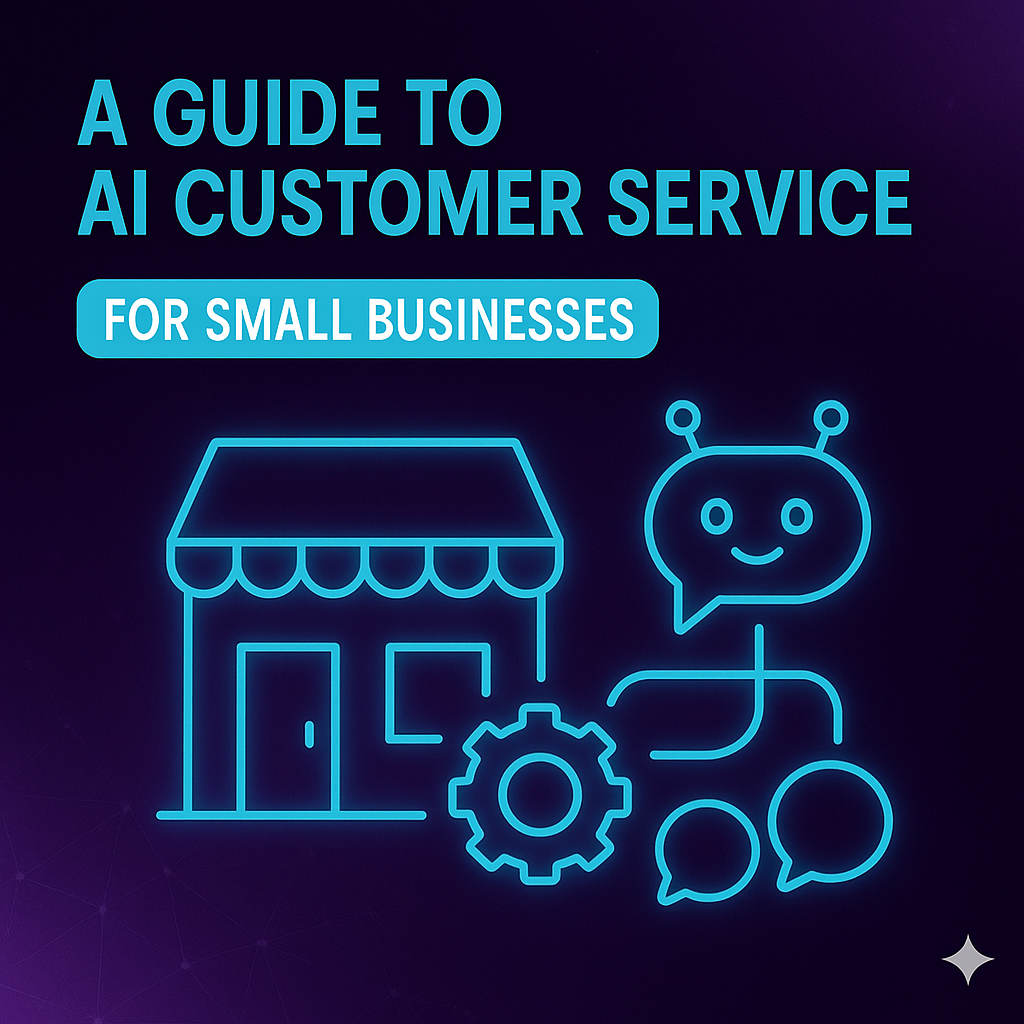“Boost your small business with AI customer service. This guide, featuring a free, no-code AI agent builder, helps you use AI tools like chatbots and virtual agents to enhance support, cut costs, and improve satisfaction.”
Running a small business often feels like juggling countless tasks. You are the CEO, the marketing guru, the sales lead, and, crucially, the customer service champion. Providing excellent customer service is key to success, but can be a massive time and resource drain. This is where Artificial Intelligence (AI) customer service steps in as a game-changer. It is not just for big corporations anymore; AI offers practical, accessible solutions for small businesses to boost support efficiency, lower expenses, and genuinely delight customers.
This guide will explain how AI can transform your customer interactions. We will explore AI’s core advantages, examine standard AI tools like chatbots and virtual assistants, and offer advice for integrating these technologies into your business without a technical headache. We will also introduce you to a fantastic, free platform for businesses like yours to build and launch their AI agents easily.

Why AI Customer Service Matters for Your Small Business
Small businesses face unique challenges. You operate with tighter budgets and often smaller teams than large enterprises. Yet, customer expectations are higher than ever. Customers want instant answers, personalized interactions, and support around the clock. Meeting these demands can be tough.
AI provides a powerful solution. Think of AI as an intelligent assistant, ready to help your customers and support your team. Here are some compelling reasons to consider AI customer service for your venture:
Boosting Efficiency and Cutting Costs
One of AI’s most immediate impacts is its ability to streamline operations and significantly reduce costs. Handling every customer inquiry can be expensive, requiring more staff and increased operational overhead. AI changes this equation.
For instance, AI-powered tools can automatically handle many routine questions. Imagine a chatbot answering common queries about store hours, return policies, or order tracking. This frees up your human team members. They can then focus on more complex, nuanced issues that truly need a human touch and problem-solving skills. This shift means you can manage more customer interactions with the same or even fewer resources, leading to substantial savings. It is about working smarter, not just harder.
Providing 24/7 Support, Every Single Day
Customers do not only have questions during your business hours. In our global, always-on world, queries can pop up at any time of day or night. If a customer has a question at 2 AM, and they have to wait until morning for an answer, they might just take their business elsewhere.
AI customer service solutions like chatbots and virtual assistants never sleep. They offer consistent, immediate support 24 hours a day, seven days a week. This constant availability means your customers always get help when needed, no matter the time zone or hour. This significantly improves customer satisfaction and ensures you never miss an opportunity to assist a potential or existing client. It is like having a dedicated support team working tirelessly for you, all the time.
Delivering Instant Responses
Nobody likes waiting. Long hold times on the phone or delayed email responses can frustrate customers. In today’s fast-paced digital world, instant gratification is often expected.
AI tools are designed for speed. They can process information and generate accurate responses in seconds. When customers use a chatbot to ask a question, they get an answer almost immediately. This rapid response capability is a significant win for customer experience. Your business values customers’ time and is committed to providing prompt, practical support. Faster resolution of simple issues means happier customers and less friction in their journey with your brand.
Personalizing Customer Experiences
Some might worry that AI makes customer service impersonal. In reality, AI can help you offer more personalized experiences. How? AI can understand individual preferences, past interactions, and purchasing history by analyzing customer data.
This insight allows AI to tailor responses and recommendations. For example, an AI agent might suggest relevant products based on a customer’s browsing history or provide solutions that align with their previous support tickets. This level of personalization makes customers feel valued and understood, fostering stronger relationships and encouraging repeat business. It moves beyond generic responses to truly address individual needs.
Scaling Your Support Effortlessly
As your small business grows, so does your customer base and, consequently, the volume of customer inquiries. Scaling a human customer service team can be challenging and expensive. You need to hire, train, and manage more people.
AI solutions, however, are inherently scalable. An AI agent can handle hundreds, even thousands, of conversations simultaneously. It does not get overwhelmed or tired. This means your customer service capabilities can expand seamlessly as your business grows, without proportional increases in staffing costs. You can easily manage surges in demand during peak seasons or periods of rapid growth, maintaining high service standards every step.
Typical AI Customer Service Applications for Small Businesses
Now that you understand the “why,” let us look at the “what.” What AI tools are available, and how can your small business use them?
Chatbots: Your First Line of Defense
Chatbots are the most recognizable form of AI customer service. These are automated programs that simulate human conversation through text or voice. For small businesses, they are a fantastic initial point of contact.
How they work: Chatbots are trained on a knowledge base of information about your business, products, and services. When a customer asks a question, the chatbot uses natural language processing (NLP) to understand the query and provide an accurate, pre-programmed response. If the query is too complex or outside the scope, the chatbot can seamlessly transfer the conversation to a human agent, ensuring no customer is left without assistance.
Practical uses for small businesses:
- Answering Frequently Asked Questions (FAQs): This is a chatbot’s bread and butter. Questions about business hours, shipping policies, product specifications, or return procedures can all be handled instantly.
- Lead qualification: Chatbots can ask potential customers questions to understand their needs and qualify them as leads before connecting them with a sales representative.
- Order tracking: Customers can simply type in their order number to get instant updates on their delivery status.
- Basic troubleshooting: For simple technical issues, a chatbot can guide customers through step-by-step solutions.
- Collecting feedback: After an interaction, a chatbot can prompt customers to provide feedback on their experience.
Virtual Customer Assistants: Beyond Basic Chat
While the terms are sometimes used interchangeably, virtual customer assistants (VCAs) often represent a more advanced form of AI than basic chatbots. They can handle more complex conversations, maintain context over more prolonged interactions, and even perform actions on behalf of the customer.
How they work: VCAs often leverage more sophisticated AI models, including large language models, to understand nuance, intent, and sentiment in customer conversations. They can integrate with your existing systems, like your customer relationship management (CRM) software or e-commerce platform, to access and use customer-specific data. This allows them to offer more personalized and proactive support.
Practical uses for small businesses:
- Personalized product recommendations: A VCA can suggest items a customer might like based on past purchases or browsing behavior.
- Appointment scheduling: Customers can book, reschedule, or cancel appointments directly through the VCA.
- Processing returns or exchanges: A VCA can guide customers through the return process, initiate return labels, and confirm refunds.
- Proactive outreach: If a system detects a potential issue (e.g., a delivery delay), a VCA can proactively inform the customer.
- Multilingual support: Advanced VCA can communicate in multiple languages, broadening your reach.
Automated Customer Service Workflows and AI Helpdesk Solutions
AI goes beyond just direct customer interaction. It can also automate internal customer service processes, making your team more efficient and responsive. This often involves integrating AI into your helpdesk or ticketing system.
How they work: AI can analyze incoming support tickets from various channels (email, chat, social media). It can then automatically categorize these tickets based on their content, prioritize them by urgency, and even route them to the most appropriate human agent or department. AI can also assist human agents by suggesting responses, summarizing past conversations, or providing relevant real-time information from your knowledge base.
Practical uses for small businesses:
- Ticket triage and routing: Automatically send billing questions to the finance department and technical issues to IT, saving time and ensuring the right person handles the query.
- Sentiment analysis: AI can analyze the tone of customer messages to identify frustrated customers, allowing your team to prioritize and address their concerns quickly.
- Knowledge base management: AI can identify gaps in your knowledge base by recognizing frequently unanswered questions by automated systems, prompting you to create new articles.
- Automated responses for common issues: Beyond chatbots, AI can automatically send pre-written email responses to common inquiries, like password reset requests.
- Agent assistance: AI tools can act as a “co-pilot” for your human agents, pulling up customer history, suggesting next steps, or drafting responses, making agents more productive.
Integrating AI Customer Service Smoothly
Bringing AI into your small business might sound intimidating, especially if you are not technically inclined. However, many modern AI tools are designed for easy integration. Here are some tips for a smooth transition:
- Start Small, Scale Up: You do not need to automate everything simultaneously. Begin with a specific area, like handling FAQs with a chatbot. Once you see the benefits and your team gets comfortable, gradually expand to other places.
- Identify Repetitive Tasks: Look for the questions or tasks your customer service team handles most frequently. These are prime candidates for AI automation, as they offer the quickest return on investment.
- Choose User-Friendly Platforms: Many platforms today offer “no-code” or “low-code” solutions, meaning you can build and deploy AI agents without writing any code. These platforms typically have intuitive drag-and-drop interfaces.
- Train Your AI Consistently: Your AI agent is only as good as the data it is trained on. Review its performance regularly, feed it new information, and refine its responses. This ongoing training ensures it becomes more accurate and helpful over time.
- Maintain the Human Touch: AI should complement, not replace, your human team. Ensure there is always a clear path for customers to connect with a human agent if their issue is complex or they simply prefer to speak to someone.
- Monitor and Optimize: Pay attention to your AI’s performance. Are customers getting their questions answered? Is your team saving time? Use the AI platform’s analytics to identify areas for improvement and make adjustments.
Introducing ScaleWise AI: Your Free AI Agent Builder
Imagine having an intelligent assistant that can handle customer questions, provide training, and engage your audience 24/7, all without you needing to write a single line of code. This is precisely what ScaleWise AI offers.
ScaleWise AI is a groundbreaking, free, and user-friendly platform and marketplace designed to empower businesses, educators, and content creators to create and deploy customized AI agents easily. It removes the technical barriers, making advanced AI capabilities accessible to everyone, including small business owners.
Key Features and Benefits of ScaleWise AI for Small Businesses:
- No-Coding Required: This is a significant advantage. You do not need to be a programmer or hire developers to build sophisticated AI agents. ScaleWise AI provides an intuitive agent creation tool with visual interfaces, toggles, dropdowns, and drag-and-drop blocks, allowing you to design powerful AI workflows quickly.
- Customizable AI Agents: Tailor your AI agent precisely to your business’s unique needs. You can design agents for various purposes:
- Customer Support Agents: Automate customer interactions, answer FAQs, process requests, and provide instant support.
- Training Agents: Create AI tutors or guides to onboard new employees, explain complex processes, or provide customer product training.
- Engagement Agents: Design interactive assistants to engage your audience, collect feedback, or provide personalized content.
- Advanced Training Capabilities: Train your AI agents on your specific business knowledge. You can upload diverse content formats, including PDFs, Docx files, MP3s, and YouTube videos. Share your existing knowledge bases, internal documents, and frequently asked questions, and ScaleWise AI will help your agent learn to respond accurately and intelligently across various topics.
- 24/7 Personalized Support: Once deployed, your ScaleWise AI agent can provide round-the-clock support to your customers. It can answer questions, offer personalized recommendations based on the data it is trained on, and ensure your customers always have a helpful resource available. This constant availability can significantly boost customer satisfaction and loyalty.
- Seamless Deployment: Easily embed your AI agent directly into your existing platforms. Whether it is your website, a mobile app, or another digital channel, ScaleWise AI provides straightforward options for deploying your custom-built agent. You can also share it with your internal team for streamlined operations.
- Integrates with Your Tools: ScaleWise AI is designed to work well with other popular business tools, including platforms like LinkedIn, Zapier, and Make. These integrations allow you to create more sophisticated automated workflows, connecting your AI agent with other parts of your business ecosystem.
- Cost-Effective Solution: ScaleWise AI’s free platform greatly benefits small businesses operating on tight budgets. It democratizes access to powerful AI technology, allowing you to reap the benefits of automation and enhanced customer service without the typical high costs associated with AI development.
- Reduces Manual Work: ScaleWise AI helps your organization scale smarter by automating repetitive inquiries and tasks. It significantly reduces your team’s manual workload, allowing them to focus on more strategic initiatives, relationship building, and complex problem-solving.
- Knowledge Sharing and Content Distribution: ScaleWise AI is a powerful knowledge-sharing tool beyond customer service. You can create AI agents that serve as information hubs, making your expertise and content more accessible to both internal teams and external audiences.
ScaleWise AI is more than just an AI chatbot builder; it is a platform that empowers small businesses to embrace AI-driven solutions for enhanced customer support, internal efficiency, and audience engagement. It is about making AI work for you, simply and effectively.
Conclusion
The world of customer service is evolving rapidly, and AI is at the forefront of this transformation. AI customer service is no longer a futuristic concept for small business owners but a practical, immediate opportunity. Adopting tools like chatbots, virtual assistants, and AI-powered helpdesk solutions can significantly enhance your operational efficiency, drastically reduce costs, and provide the 24/7, personalized support your customers now expect.
The benefits are clear: faster response times, consistent service, greater scalability, and ultimately, happier customers who feel valued and heard. As we have seen with platforms like ScaleWise AI, getting started with AI-driven customer support is more accessible than ever, with free, no-coding solutions designed to empower you.
Do not let the idea of complex technology hold you back. Identify where AI can make the most significant difference in your customer interactions. Then, explore the user-friendly tools available to you. Embracing AI customer service means not just keeping up with the competition but pulling ahead, creating a more responsive, efficient, and customer-focused business ready for whatever the future holds. Your customers, and your bottom line, will thank you for it.
FAQs About AI Customer Service
Q1: Is AI customer service only for large companies?
No, not. While large enterprises have used AI for a while, the technology is now accessible and affordable for small businesses. Many user-friendly, no-code platforms allow business owners to implement AI solutions.
Q2: Will AI replace my human customer service team?
The goal of AI in customer service is not to replace humans entirely but to augment their capabilities. AI handles repetitive, routine tasks, freeing up your human team to focus on complex issues, build stronger customer relationships, and handle situations requiring empathy and nuanced judgment. It is about creating a more efficient and effective partnership between AI and humans.
Q3: How much does AI customer service software cost for a small business?
Costs vary widely depending on the features and scale. Some platforms, like ScaleWise AI, offer free tiers or completely free access, which is excellent for getting started. Others have tiered pricing based on usage, number of agents, or advanced features. Often, the cost savings from increased efficiency and reduced staffing needs quickly outweigh the investment.
Q4: How long does it take to set up AI customer service?
For basic implementations like an FAQ chatbot on a no-code platform, setup can take as little as a few minutes to a few hours. More complex integrations or custom virtual assistants will naturally take longer, but generally, the process is much faster than traditional software development. Many platforms offer pre-built templates to speed things up.
Q5: What kind of information do I need to train an AI customer service agent?
You will need your business’s knowledge base to train an effective AI agent. This includes FAQs, product information, service details, company policies, and other data your customers commonly ask about. The more comprehensive and organized your data, the better your AI agent will perform. Platforms like ScaleWise AI allow you to upload documents, videos, and more to facilitate this training.
Q6: Can AI customer service handle sensitive customer information securely?
Data security is paramount. When choosing an AI customer service provider, ensure they have robust security protocols, data encryption, and compliance with relevant data protection regulations (like GDPR). Always review their security measures and privacy policies carefully.
Q7: How can I ensure my AI customer service sounds natural and not “robotic”?
Modern AI can generate surprisingly human-like responses, especially those leveraging advanced language models. Provide precise, concise, and conversational training data to make it sound more natural. Regularly review its responses and refine them to match your brand’s tone. Some platforms also allow for customization of the AI’s persona.
Q8: What if the AI cannot answer a customer’s question?
A well-designed AI customer service system includes a seamless handoff to a human agent. If the AI cannot understand a query or provide an adequate answer, it should automatically escalate the conversation to a human team member. This ensures no customer issue goes unresolved.





